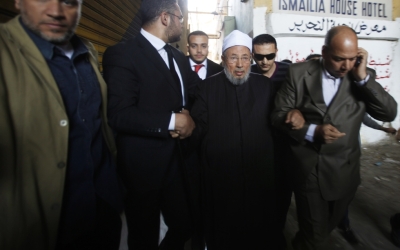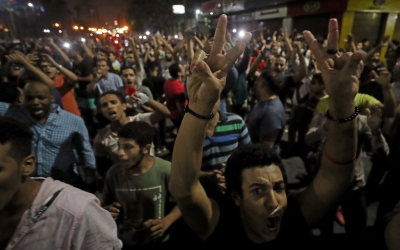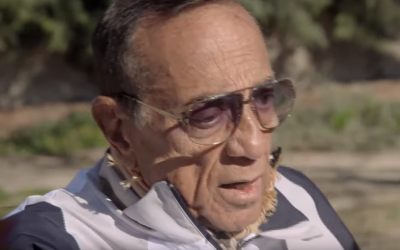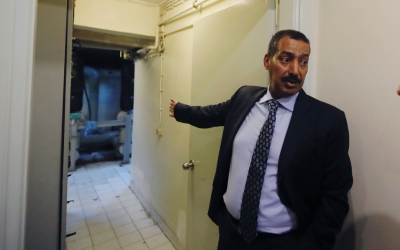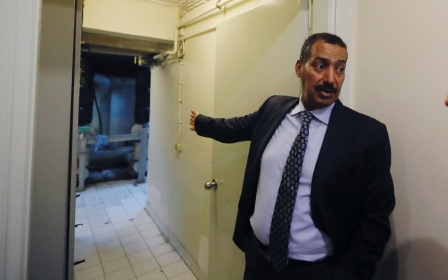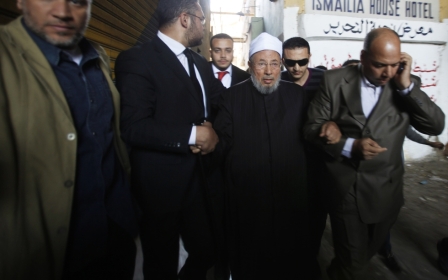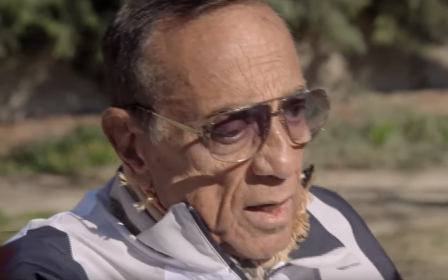EXCLUSIVE: Egyptian authorities use Interpol to target dissidents abroad
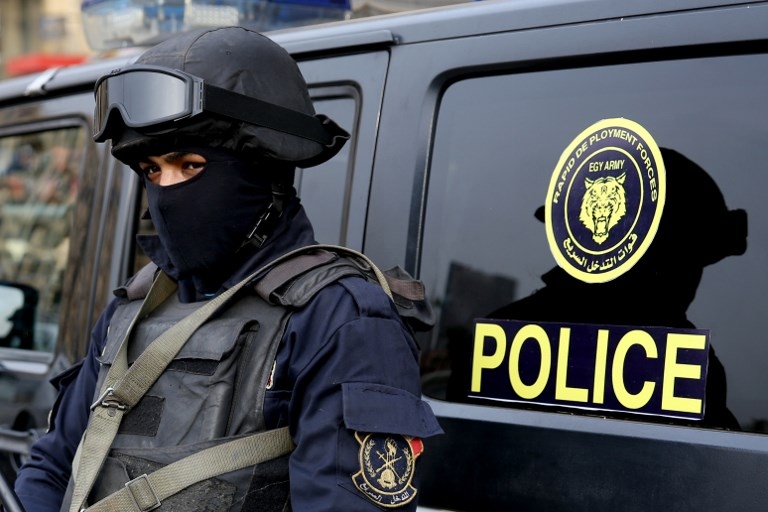
A Middle East Eye investigation can reveal that Egyptian authorities are using the international policing body Interpol to target political opponents of President Abdel Fattah el-Sisi abroad.
A series of cases show Egyptian attempts to extradite exiled dissidents using Interpol's red notice and diffusion alert systems, which allows member states to request the arrest of alleged criminals who have fled abroad.
Sisi has presided over a brutal crackdown on dissent and opposition to his rule since seizing power in a military coup in 2013, and has sought to consolidate his rule through a constitutional referendum in April, which could keep him in office until 203o.
The latest target is the judiciary, with the government seizing authority over key appointments.
During this year alone, at least 21 detainees are reported to have died in prison. Enforced disappearances and death sentences have also surged under Sisi.
The past few days have seen large street protests in major cities calling for Sisi to be removed, with crowds gathering on Friday night in Cairo's Tahrir Square, the epicentre of the 2011 revolution that toppled longtime leader Hosni Mubarak.
The demonstrations followed calls for protests by Mohamed Ali, an exiled construction magnate whose online videos accusing Sisi of corruption have gone viral in Egypt and prompted a surge in the use of anti-Sisi hashtags online.
Hundreds have been arrested since Friday, including Mahienour El-Massry, an award-winning human rights lawyer who is representing some of the protesters.
'Request for cooperation'
Interpol is an organisation which helps to facilitate cooperation between national law enforcement agencies. With 194 member states, it provides a unique international network for tackling criminal activity.
A spokesperson for Interpol told MEE: "A red notice is not an international arrest warrant, but rather a request for cooperation based on an arrest warrant issued in a member country."
"It is up to each member country to decide whether to act on this request."
Red notices and diffusion requests from member states must be found to comply with Interpol’s rules and constitution before being published.
However, experts are increasingly concerned about the risk these alerts pose to innocent dissidents.
The prominent Egyptian cleric Yousef al-Qaradawi was removed from the wanted list late last year after Interpol admitted his charges were "of a political character".
Rodney Dixon, Qaradawi’s lawyer for the proceedings before Interpol, told MEE that "the political motivations were clear through the lack of proper, verifiable evidence presented by the Egyptian authorities".
He also warned that individuals extradited to Egypt “face the direct risk of not being able to have a fair trial and then being detained,” and that “there is clear evidence from many cases of poor conditions and being exposed to torture in order to obtain confessions which are then used in the trial proceedings”.
'Victims of abusive red notices'
Critics claim that the minimum requirements red notices and diffusions must comply with to be published are not sufficient to guarantee that they are not politically motivated.
The current system also offers no opportunity for the subject of the notice or diffusion to dispute the allegations at the time of the request.
Yuriy Nemets, a US-based lawyer and expert in Interpol abuse cases, told MEE that Interpol cannot disclose the contents or even existence of a red notice or diffusion to the individual concerned without first obtaining permission from the respective government.
He said: “Interpol recognises that it cannot conduct a comprehensive screening of red notices and diffusions based on the information that governments are required to include in them.
“Nevertheless, Interpol almost always allows their dissemination, while victims of abusive red notices and diffusions usually become aware of their existence only after they are detained.”
Interpol told MEE: “The compliance review is based on the information available at the time... Whenever new and relevant information is brought to the attention of the General Secretariat following publication, the task force re-examines the case.”
For those who are made the subject of red notices and diffusions, lengthy spells of detention and restrictions on travel are common while extradition proceedings are carried out.
Pursuing Morsi's men
Subjects of the alerts may file a complaint with the Commission for the Control of Interpol's Files and request their removal.
The procedure, however, does not comply with modern democratic due process requirements, according to Nemets, who also stresses: "Individuals who dispute abusive red notices and diffusions do not have the right to a hearing, to examine evidence that governments produce against them, or the right to appeal the commission's decisions."
MEE spoke to three individuals who had been subject to red notices requested by the Egyptian government. All were senior members of the late former president Mohamed Morsi’s Freedom and Justice Party (FJP).
As part of the opposition, they were forced to flee Egypt after the military takeover in July 2013. All three are the subject of allegations of crimes against the state.
The individuals also had their red notices removed after the Egyptian authorities failed to provide verifiable evidence of their allegations.
Hossam Abdel-Fattah is a urologist based in Qatar. He left Egypt after being sentenced to death in absentia, along with 528 others, for allegedly taking part in an attack on a police station that led to the death of a policeman.
The trial in March 2014 lasted a matter of hours with almost no opportunity for defence lawyers to present their case. The trial was widely condemned for its lack of due process, including by the UN.
Nevertheless, Interpol accepted Egypt’s red notice request against Abdel-Fattah, which he only discovered upon being arrested in Mumbai on a visit to a medical conference in 2016.
He was imprisoned for two months and forced to remain in India for two years while the case against his extradition was fought.
He told MEE: “I had to stay in India without a passport and visa. I could not work. My family had no salary and had to return to Egypt. I was alone.
“I am so angry with Interpol. How can they put these names on their lists when they know the Egyptian government are liars?”
The red notice against Abdel-Fattah was dropped in August 2017 while he was still in India. However, this does not guarantee that his name has been removed from the local databases of member states.
“This is the most dangerous thing,” Abdel-Fattah told MEE. “There are very limited places I can go. My country could still extradite me at any time if I travel.”
Detained in Albania and Ukraine
Elsayed Elezaby was a senior engineer before the 2013 coup. He told MEE that soon after Sisi came to power he was informed of false terrorism charges made against him.
This meant his assets were seized and he faces a minimum of 25 years in prison if he returns to Egypt.
Due to a red notice, Elezaby was held for six months in Albania and later for over a year in Ukraine.
Both countries refused to extradite him due to the political nature of the allegations and fears he would be at risk of persecution.
Elezaby managed to get his red notice removed in 2017. However, he is currently stranded in Turkey as the Egyptian authorities have refused to issue him with a passport.
“Interpol should not be supporting Egypt’s terrorist regime. They have to separate the political from the criminal,” Elezaby told MEE.
“Every day Interpol’s decision loses me credibility. Now I am trapped with no travel documents and cannot move to seek asylum. There is no light at the end of the tunnel.”
'The red notice destroyed my life'
A third man who spoke to MEE asked not to be named, saying: “I am still in fear of the Egyptian regime.”
Previously employed as a doctor, he was sentenced to death in absentia in the same trial as Abdel-Fattah. Again, he only became aware of the red notice against him when he was later detained in Qatar.
The red notice was challenged and removed last year, but the man said he still avoids any travelling and is worried for the future as the Egyptian authorities are refusing to renew his passport.
“The red notice destroyed my life and the life of my family,” he told MEE.
Politically motivated notices
Interpol’s constitution strictly forbids “any intervention or activities of a political, military, religious or racial character”.
However, this has not prevented politically motivated notices being made by a number of member states.
The Bahraini footballer Hakeem al-Araibi was detained on the basis of a red notice in Thailand earlier this year, despite having been granted refugee status by Australia.
The prominent Uyghur activist Dolkun Isa had China’s red notice against him removed last year.
Turkey and the UAE are two other nations which have also been accused of utilising the red notice system to undermine political opponents.
Interpol have made reforms to the alert systems. In 2014, the police body undertook a comprehensive review of all supervisory mechanisms. Reforms designed to strengthen the compliance checks for red notices and diffusions were adopted in 2016.
The independent body that ensures Interpol conforms to its constitution, the Commission for the Control of INTERPOL’s Files (CCF), also underwent widespread reforms in 2016 to enhance its supervisory capabilities.
Jago Russell, chief executive of Fair Trials, a charity which defends the rights of people facing criminal charges outside their own country, told MEE: “Interpol has an important role to play in the global fight against crime, but not at the expense of human rights.
"We’ve worked with Interpol on reforms to help prevent misuse, and they deserve credit for this, but cases like these suggest there is still a long way to go.”
Interpol told MEE that in 2018 it also began reviewing “the significant number of red notices and wanted persons diffusions authorised prior to implementation of the robust legal compliance review in 2016.”
The spokesperson added: “This review is crucial to ensuring the integrity of notices and diffusions, as it is often these older notices that are highlighted by the media and the international community as presenting issues of compliance."
However, there is evidence that Egyptian dissidents are still at risk.
Last year, it was reported that a former minister in Morsi’s government, Mohamed Mahsoub, was arrested in Italy due to a red notice issued in 2016. He was later released after Italy refused Egypt’s extradition request.
Loopholes in the system
As they are rarely made public, it is difficult to know how many Egyptian nationals may still be the subject of politically motivated red notices and diffusions.
Mohamad Jamil, director of the Arab Organisation for Human Rights in the UK, told MEE that he had helped handle multiple cases against Egyptian dissidents.
He told MEE: “There is a flaw in the system that allows dictatorial regimes, whose leaders commit crimes against their own people, to misuse the system.
“In order for Interpol to carry out its mission optimally, it must classify countries according to their human rights history.”
Nemets said: "Interpol's rules contain serious loopholes that allow governments to abuse its channels for political and other unlawful purposes.
“Interpol needs to carry out further reforms, and its member countries must undertake an obligation to punish government officials responsible for Interpol abuse."
A spokesperson for Interpol said: “Interpol continues to be vigilant regarding the integrity of its notices and diffusions system, and we are constantly reviewing our processes and procedures to identify opportunities for further improvements in terms of the consistency, timeliness, and effectiveness of our review, and adjust our processes as appropriate.
“In 2018, a further review of Interpol's Rules on the Processing of Data was endorsed by the General Assembly which is currently underway.”
This article is available in French on Middle East Eye French edition.
Middle East Eye propose une couverture et une analyse indépendantes et incomparables du Moyen-Orient, de l’Afrique du Nord et d’autres régions du monde. Pour en savoir plus sur la reprise de ce contenu et les frais qui s’appliquent, veuillez remplir ce formulaire [en anglais]. Pour en savoir plus sur MEE, cliquez ici [en anglais].


